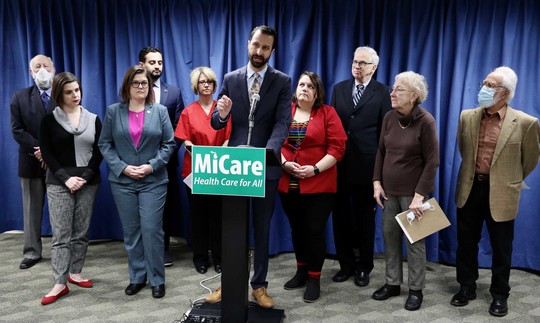MiCare plan would provide comprehensive care, cut out insurance profiteers
LANSING — State Rep. Yousef Rabhi (D-Ann Arbor) today announced House Bill 5966, a universal single-payer plan to provide comprehensive health coverage to every resident of Michigan. MiCare would be publicly administered, cutting out the profit motive and removing costly bureaucracy designed to deny care. Rabhi was joined at the announcement by advocates and organizations supporting universal health care, including the Michigan Nurses Association, Michigan for Single Payer Healthcare, Michigan Universal Health Care Action Network and Physicians for a National Health Plan. Congresswoman Debbie Dingell (D-MI) sent a pre-recorded message of support for the MiCare bill.
“Everyone has the right to get the care they need without the constant threat of medical bankruptcy,” Rabhi said. “Our current system has failed, leaving too many Michiganders destitute, sick or dead. It is immoral to continue to prioritize corporate profits over people. MiCare will redirect the vast resources that are currently enriching insurance companies to comprehensive care for every Michigander.”
“COVID has shone a light on the deep fractures in our current system. Throughout the pandemic, millions of Americans lost their jobs — and their health care — and too many were left hanging out to dry,” Dingell said. “This important legislation will create a universal single-payer health care system at the state level and finally guarantee coverage to every hardworking Michigander — saving lives, reining in growing healthcare costs, making our state more competitive and strengthening our economy. I am proud to be a partner in this fight by leading efforts in Congress to establish this system nationally with Medicare For All. Americans are counting on us, and we must deliver.”
“Nurses believe health care is a human right, not a privilege for those who can afford it, and we applaud Rep. Rabhi’s plan to ensure that everyone can get the care they need,” said Jamie Brown, a critical care RN and president of the Michigan Nurses Association. “The obsession with profits permeates our whole health system, putting critical screenings, medications or treatment out of reach for too many people. Medical bills are a leading cause of bankruptcy in our country. No one should have to worry about how they are going to afford health care for themselves or their loved ones.”
“I became a doctor because I wanted to help people heal, not to spend time on billing hassles and fighting insurance companies,” said Dr. James Mitchiner, an emergency medical physician. “In the emergency department, I see what happens when people can’t afford timely medical care. We need a system that covers everyone and gets insurance companies out from in between people and their doctors.”
“I dedicated my career to improving care for patients who fall through the cracks of our current care system,” said Dr. Robert R. Frank, former Dean of Wayne State University School of Medicine. “But it would be more effective to address the problem at its source. We need seamless, universal health coverage that doesn’t drop people into poverty and poor health.”
Rabhi’s MiCare plan would create a publicly administered system to cover comprehensive health care services for every resident of the state. The system would pay independent providers for necessary care, including mental health, dental and prescription drugs. An estimated cost savings of $20 billion would be achieved by cutting out insurance company profits and their redundant red tape, while leveraging economies of scale to control prices. Prescription drug prices would be reined in by using the rates negotiated by the Veterans’ Administration, and medical services would be reimbursed at a fair rate.
Under MiCare, the state would seek waivers to incorporate federally funded health insurance programs such as Medicaid, Medicare and Affordable Care Act Exchange plans, combining these with state revenues into a single-payer system that would vastly simplify billing. For those who have primary insurance through an employer or a public program not yet incorporated by a waiver, MiCare would be the secondary payer, guaranteeing comprehensive coverage for everyone in the state. MiCare would rely on public funds, without premiums, deductibles, co-pays or other out-of-pocket costs.
“Everyone always asks how we can afford a universal health care plan, but the fact is that we in the U.S. are already paying by far the highest health care costs in the developed world, for much worse outcomes,” Rabhi said. “MiCare is a way for the people of Michigan to take charge of our health insurance system so we can direct health spending in the public interest, away from private profits. Together, we can save money and save lives.”
###
More information: https://housedems.com/yousef-rabhi/micare/

